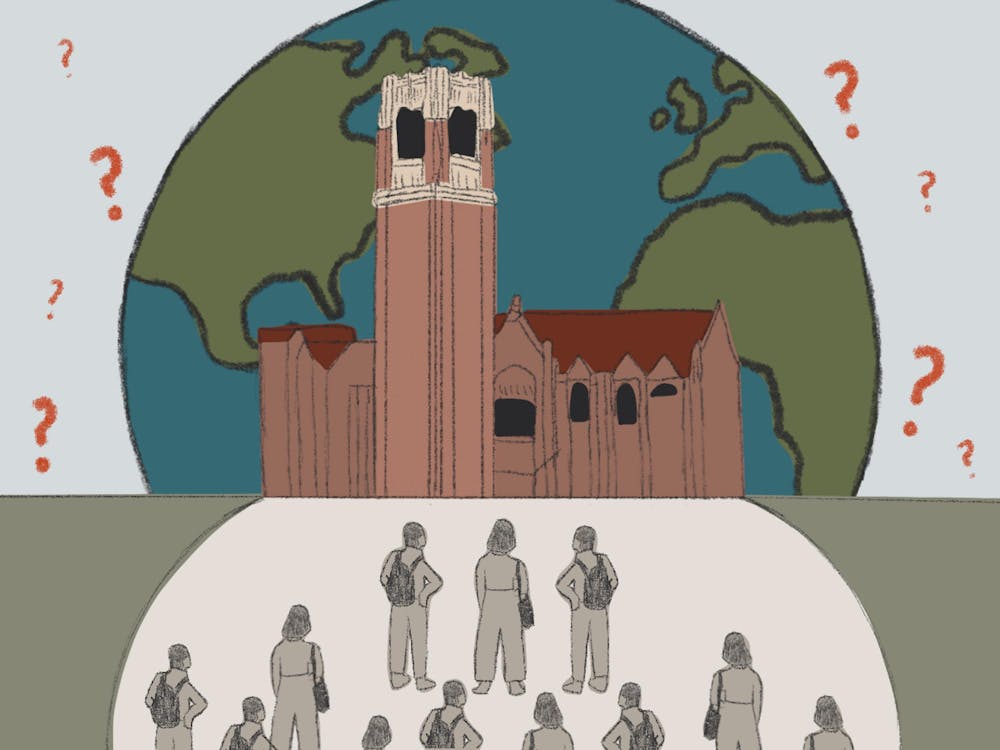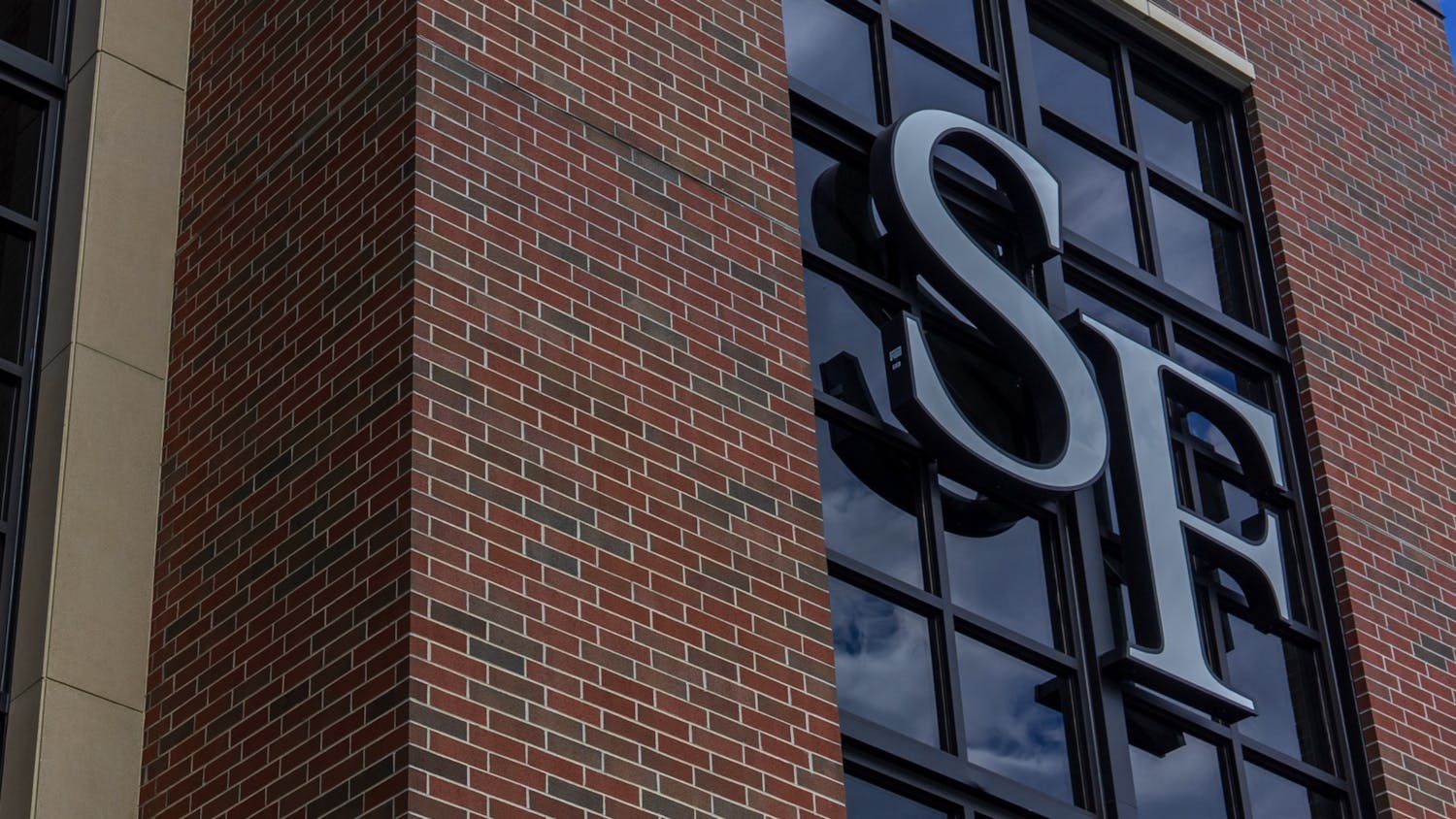Leaving an entire life behind, assimilating to a foreign education system and watching parents sacrifice life savings are all things students on F-1 visas knowingly sign up for. The reward? Freedom of speech, superior academics and — for many — political stability.
When the benefits become unclear, so do the reasons to stay.
In a sweeping move, the Trump administration revealed plans on March 14 to suspend visas for citizens from 41 countries as part of a broader strategy to curb immigration. These countries, including Myanmar, Venezuela and Haiti, are flagged for concerns about terrorism, security and political instability.
Since late March, over 1,000 students have had their visas revoked nationwide, according to the Associated Press. As of April 10, eight UF students had their visas revoked or legal status terminated. UF administration has not confirmed its reasons for the revocation.
This came after President Trump issued an executive order on Jan. 20, requiring the Secretary of State to identify countries “for which vetting and screening information is so deficient as to warrant a partial or full suspension on the admission of nationals from those countries.”
While the proposed visa suspensions are still under review, the list alone was enough to send a wave of anxiety through students.
A 21-year-old UF political science sophomore, who was granted anonymity for fear of visa revocation, is one of two students from a country the Trump administration is considering imposing full visa suspensions on.
“Every day you wake up and you don’t even want to look at your phone because you're afraid of what will happen next,” she said.
Feeling trapped
Originally planning to visit family and friends in Norway over spring break, the political science major canceled plans and remained in the U.S. over concerns her legal status would be revoked if she tried to reenter the country.
The proposed visa suspension is split into three categories: red, imposing full visa suspension; orange, sharply restricted; and yellow, countries given 60 days to address concerns.
If she left the country, she fears she would not be able to return and finish her education because her country is on the red list, she said. “Which is why I'm in the country,” she said. “Even though I really want to go back home and see my family.”
“The political situation made it too risky,” she said. “Even if I left and returned, there’s no guarantee that I’d be allowed back in [to the U.S.].”
For the political science student, the promise of a better education in the U.S. has been overshadowed by the growing uncertainty surrounding her future. Despite having a valid student visa, she said she worries any public comments she makes or animosity she shows toward the U.S. government could be perceived as a threat. She’s felt increasing pressure to censor herself, she added.
"Even if you aren’t political, the chances of you having your visa revoked just via association or something as simple as liking a post or having a conversation with someone else who might have talked about [American politics] would still put you at risk,” she said.
The UF International Center had sent a few emails about having an I-20 or passport on hand, she said, but that was the extent of the communication. These lack guidance on what to do if stopped or questioned by authorities, or if her legal documents were not recognized by police concerned her, the political student added.
“A lot of international students on campus are genuinely afraid and worried,” she said. “We don’t have anyone.”
The struggle to belong
One international student has had the opportunity to attend high school and college in the U.S.: first at an International Baccalaureate boarding school she attended her last two years of high school, and now UF.
A 20-year-old UF art sophomore from Hong Kong, whose name and the boarding school she attended have been omitted over her safety concerns, said she believed pursuing higher education in the U.S. would provide intellectual freedoms she wouldn’t have in her home country.
But, she said she has slowly watched that security and comfort disappear. The turning point for her came when UF removed programs tied to diversity, equity and inclusion.
“It wasn’t just political, it was personal,” she said.“That was the first time I started feeling like I didn’t belong here.”
Her concerns about belonging have grown this semester, she said. The Hongkongese student felt the silence from UF surrounding deportations only exacerbated her anxiety.
Under FERPA student privacy protections, the university is not at liberty to discuss students’ immigration status. This has left many feeling as if the information that concerns them is being hidden or ignored, the Hongkongese student said.
Campus fear grew after Felipe Zapata Velasquez, a 27-year-old food and resource economics third-year international student, self-deported early April after being detained by ICE. He was arrested after driving under a suspended license.
The UF International Center sent international students a letter April 16 on behalf of Interim UF President Kent Fuchs, where he offered words of reassurance and understanding to the international student community at UF.
“Your presence here at the University of Florida is critical to our success. You are central to our mission and essential to our identity as a leading research institution,” he wrote.
For the Hongkongese student, Fuchs' message felt like "a stab in the back" or “just a mockery of the current situation."
Beyond the letter, the university has nothing to add regarding the situation, UF spokesperson Cynthia Roldan said.
“That’s when I realized they were only interested in what we could contribute to their research,” she said. “When it comes to our concerns, we’re silenced.”
With the unfolding political turmoil and tension toward international students, the student said she doesn’t see a future for herself in the U.S.
The Hongkongese student said she is ready to return home; the promise of freedom she once believed the U.S. offered now feels like a distant memory.
Searching for stability
For Alejandro Espinach, a 20-year-old UF finance freshman from Costa Rica, staying optimistic amid tightening immigration laws is challenging. While he focuses on his studies, his real anxiety lies in the uncertainty of the job market after graduation.
Espinach moved to the U.S. with the dream of securing a world-class education, hoping a degree from UF would open doors to better career opportunities than what he could find back home in Costa Rica. But the complexities of U.S. visa restrictions and the limited time he has to work in the country have cast a shadow over his aspirations.
“I’m focusing more on what I came here to do, which is study,” Espinach said. “But I see that people are being sent back, and I don’t want [deportation] to be the reason I lose my opportunities here.”
The uncertainty surrounding his future in the U.S. has taken a toll on his mental health.
Espinach is struggling to figure out what will happen next, especially with constant changes making it hard to plan, he said. While there are immense challenges, studying in the U.S. offers more opportunities than Costa Rica could offer, he added.
His connection to his family and home country remains strong, he said, and despite his ambitions to work in the U.S., Espinach acknowledged returning to Costa Rica might be the only option as he watches college-aged immigrants across the country face deportation.
For now, Espinach said he is trying to focus on his studies while navigating the complexities of the immigration system that could soon derail his American dream.
“I knew that because I’m an international student, I’d have to work harder to be outstanding, but I never realized how difficult everything else would be,” he said.
Contact Vera Lucia Pappaterra at vpappaterra@alligator.org. Follow her on X @veralupap.
Vera Lucia Pappaterra is the enterprise race and equity reporter and a second-year journalism major. She has previously worked on the university desk as the university general assignment reporter. In her free time, she enjoys deadlifting 155 lbs. and telling everyone about it.






